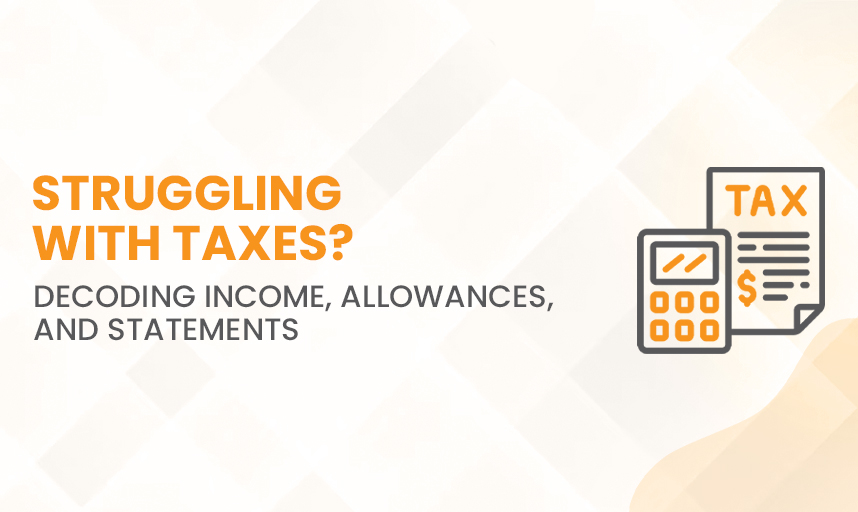Struggling with Taxes? – Decoding Income, Allowances, and Statements

Have you ever found yourself tangled in the complexities of income, allowances, and reimbursements when preparing your tax return?
Handling the financial statements and comprehensive income can be like decoding a complex code. Fear not, in this blog, we’ll break down the essentials, providing you with a clear understanding of what to include and what to leave out.
Income And Allowances
When it comes to your tax return, clarity is key. As an employee in the building and construction industry, the income you need to include covers various aspects:
- Salary and Wages: This includes not only regular pay checks but also cash or bonus payments.
- Allowances: Any additional allowances provided by your employer should find a place in your tax return.
- Compensation and Insurance Payments: Payments made under income protection insurance policies to replace salary and wages fall into the inclusion category.
However, not everything that comes your way is taxable. Reimbursements, for instance, are not considered income. These are amounts your employer pays you to cover specific expenses, and they should be kept separate from your taxable income.
Your income statement or payment summary is your go-to document for a snapshot of your salary, wages, and allowances for the year.
The Allowance Problem
Allowances are a bit like financial Swiss Army knives – they serve various purposes. Your employer may provide them to help with work-related expenses, compensate for specific work conditions, or recognise special skills or qualifications. It’s crucial to include all reported allowances in your tax return.
However, not all allowances make it to the income statement. Some may appear on your payslip instead. Travel allowances and overtime meal allowances are examples. You don’t need to declare these in your tax return unless you’re planning to claim a deduction.
Speaking of deductions, if you spend your allowance on work-related expenses that qualify, you’ll need to include the allowance as income but can also claim deductions for the incurred expenses. Keeping meticulous records is essential in this scenario.
What About Reimbursements?
Reimbursements are a different breed. If your employer reimburses you for specific expenses, you don’t need to include that reimbursement as income. However, you can’t double-dip by claiming a deduction for these reimbursed expenses. Understanding the clear line between allowances and reimbursements is key to ensuring accurate reporting and maximising potential deductions.
Handling The Financial Statements
Now, let’s shift our focus to the broader financial statement landscape. Entities must adhere to specific guidelines when presenting income and expenses in a statement of comprehensive income. For instance:
- No Extraordinary Items: The notion of presenting items as extraordinary on the statement of comprehensive income or in the notes is a no-go.
- Separate Disclosures: Material income and expense items, such as write-downs, restructurings, disposals, litigation settlements, and other reversals, require separate disclosure to provide transparency.
- Losses and Gains from Asset Sales: Gains and losses from asset sales should be netted off, with material gains presented separately from revenue.
Understanding these principles aids transparency in financial reporting and ensures that stakeholders have a clear view of an entity’s financial performance.
Conclusion
In conclusion, when it comes to income, allowances, and financial statements, a clear understanding is your best ally. By decoding the difficulties, you empower yourself to handle the tax landscape with confidence. And now if you are looking towards tax preparation and require expert taxation advice, you can reach out to KPG Taxation. Their expert tax agents will help you clear your financial path and maximise your deductions.
- Categories
- Tax

Focus On Growing Your Business, Leave The Accounting On Us!
- Income Tax : File your taxes & get the best claims & returns.
- Accountancy : Hire expert accountants to manage your transactions.
- Bookkeeping : Let us handle your record books and expense reports.
- Business Advisory : From company set-up to payroll, we handle it all.



